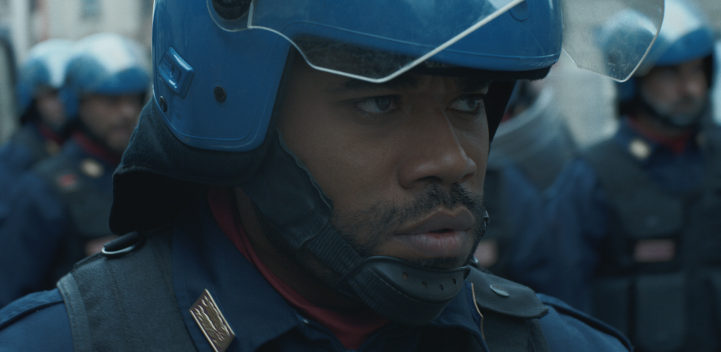Vassilis Kroustallis reviews the Italian feature The Legionnaire by Hleb Papou, premiered at Locarno Film Festival 2021.
Immigration, housing and the meaning of order enforcement are as contemporary topics as any, yet they didn't just come out with they Syrian war and disaster. In the Locarno-premiered feature film 'The Legionnaire', Belarus-born, Italian-based director Hleb Papou presents a film full of empathy for the dilemmas that long-term immigrants need to face in an occupied Rome building, and what it means to have stakes on both sides of the cat-and-mouse game.
With a matter-of-fact (but somehow predictable) narrative and a pace that shifts between a family drama and a documentary chronicle, The Legionnaire still offers a relevant perspective on an issue that makes good material for social media and tabloids, but here explored in a more rounded way.
Sharing the same two-fold structure of Nadav Lapid's 'Policeman '(2011), alternating between the order-enforcing unit and the building occupants in a cat-and-mouse setting. Papou's film spends less time to deliberate in the overall structure of the game than building up the immediate family surroundings of the main character, Daniel (Germano Gentile).
Based on his Venice-premiered 2017 short 'The Legionnaire', Papou presents Daniel aka Hot Choc for his colleagues (Germano Gentile) as the only African-Italian officer in the Rome riot police. Daniele is kind and caring, efficient in his work duties, a no-nonsense colleague. Being married and with an expectant wife, he seems to have ticked all the right boxes of assimilation; in truth, he keeps a secret from both his superior commander Aquila ('Eagle', Marco Falaguasta) and his colleagues. His brother Patrick (Maurizio Bousso) and his mother (Félicité Mbezelé, a soberly calm presence) are among the residents to be evicted from the occupied building.
The film opens with direct confrontation, which Daniele seeks to avoid. Soon he will learn that his own excuses will be to no avail; another round of negotiations with the mayor, the city council and the police needs to start. In the between, Daniele will unsuccessfully try and persuade his family to move out, promising them a still uncertain future. Things will take its prescribed toll and conflict after a while.
Moving between the two worlds, Papu is keen to describe the bigotry and the camaraderie of the special police unit, all at the same time. Daniele is one of the clan, since he himself chose to become impenetrable -therefore easy to fit into patterns. His colleagues vie with his own family for attention, and present him with an alternative, clean-version of the family. In one such scene where a lunch gathering takes place, Daniele's wife proposes Aquila to be the godfather of her own baby, to the approval of the whole unit -in a scene lit and shot as if we were part of the wedding scene in 'The Godfather' (1972).
On the other hand, social realism abides in the ever-long corridors of the occupied building. Production design is very particular, though, in the film; each room has its own decorated space and function, and each resident their own personal space -all of them retaining the communal space of public voting. Old and young, reckless and concerned, the figures present a mosaic of differentiated attitudes which prohibit any ready-made poverty-porn attitude. Residents are individuated, but united in their attempt not to have a homeless feature.
The film makes it easy to take sides, but at the same time moves further to examine the family dynamics. Patrick is the archetypal rebel and leader compared to his brother Daniele, and Daniele needs to counteract with sudden bursts of violence in his training programme to compensate for his insecurity. 'The Legionnaire' sometimes spends more time with the state of everyone surrounding Daniele than with getting a closer look at his own insecurities; that said, Germano Gentile is fittingly cast as the reluctant action hero whose calm demeanour is not enough to keep him safe at bay.
'The Legionnaire' investigates a personal and family affair among a very pressing social situation. It is mostly about the need to be true to yourself as the first step before facing everything else. It sounds like an empty truism, but the film builds capably its own world around this.
The Legionnaire premiered at Locarno Film Festival 2021 (Concorso Cineasti del presente).

